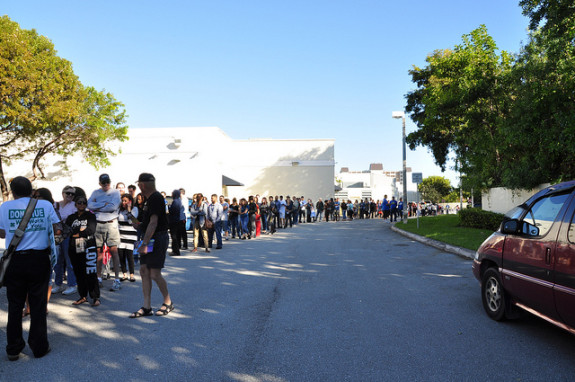By Ashley Lopez
Florida Center for Investigative Reporting
A new report from The Pew Charitable Trusts found that most states did a better job running elections in 2012 in comparison to previous years. Florida, however, had some setbacks in 2012 when it came to things like wait times.
According to the report:
Florida is neither a high- nor low-performing state, and though its overall EPI score increased slightly between 2008 and 2012, the boost was less than the average improvement across the country. Florida was held back to a large degree by dramatic spikes in average wait time to vote and rejected registrations.
Pew ranked Florida dead last when it came to wait times with an average 45 minutes during that presidential election.
According to Pew:
This indicator, which measures the average time spent waiting to vote at the polls, relies on data from the Survey of the Performance of American Elections, which was run through the Massachusetts Institute of Technology and included a representative sample of voters from every state and the District of Columbia.
Lines at polling places are one of the most noticeable issues for voters on Election Day. Although long waits can indicate excitement surrounding an election, significant variation in polling place lines across precincts and communities may mean that inefficient administration is making voting more difficult for some voters. Average wait time is one measure of the ease of voting: The less time a voter waits to cast a ballot, the more convenient the experience. The Presidential Commission on Election Reform issued a report in 2014 saying that no voter should have to wait in line longer than 30 minutes.
Many voting rights advocates blamed a law passed in the GOP-led Florida Legislature in 2011 for the long lines. Among other things, the law cut early voting hours around the state. State lawmakers also put 11 lengthy proposed constitutional amendments on the ballot that year, which many experts say also slowed down lines during that election.
The new reports also found Florida had a high percentage of mail ballots unreturned. According to the report, 18 percent of all mail ballots transmitted were unreturned in the state.
Lastly, the Sunshine State also scored badly (39th nationwide) when it came to the percentage of people who cited registration or absentee ballot problems as a reason why they didn’t vote.
While absentee ballots were not addressed in that 2011 overhaul of voting laws, voter registration was one of the most contentious provisions in the bill.
The 2011 voting bill made it much harder for third party groups to register voters for the 2012 presidential election. Among other things, the law imposed steep fines on groups that didn’t turn in registration forms quickly. Voter registrations groups, such as the League of Women Voters, decided to not register voters for the first time in their history because of the new law. Experts said this made a big dent in the state’s voter registration numbers. In fact, the state’s voter registration dropped 2.4 percent compared to 2008, according to the new Pew report. Before the 2012 election, a court eventually halted the voter registration provisions of the 2011 law.
However, state officials have said this latest report doesn’t take into account changes made last year to the state’s voting laws, which in essence reverse the changes made by the 2011 law.
According to The Tampa Bay Times/Miami Herald:
Scott’s chief elections official, Secretary of State Ken Detzner, sought to debunk the study’s negative findings by noting that the state retooled voting laws in 2013 to address historically long lines at the polls by expanding potential early voting hours and types of sites that can be used for early voting.
…”The previous practices reviewed in the report no longer reflect today’s voting laws because of last year’s reforms,” Detzner said.
In response, David Becker, director of Pew’s elections initiatives, said: “We appreciate the great work Florida is doing to improve their election administration and we look forward to seeing how the policy changes they made after the 2012 election affects their performance in 2014 and beyond.”
However, Democrats argue more needs to be done to protect voting rights in the state, but any legislative effort will likely not go anywhere this year.
The Times/Herald reported:
At the Capitol Tuesday, Democratic legislators, joined by like-minded voter advocates, made last-ditch calls for what has become a hopeless cause: asking Republican legislative leaders to take up their bills to expand voter protections, including requiring the state attorney general to get Supreme Court approval of any voting law changes.
The session will end in a few weeks without those bills getting a public hearing.
As Florida heads into a highly competitive campaign for governor, Democrats are expected to continue to use the threat of voter suppression as a way to galvanize voters to get to the polls.
This new report about Florida’s voting woes comes just a week after a federal court ruled that the state broke federal laws when it tried to systematically purge non-citizens from its voter rolls in 2012.

